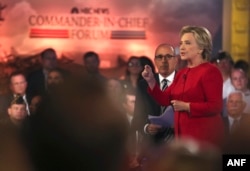Republican presidential candidate Donald Trump praised Russian President Vladimir Putin Wednesday, saying he has been more of a leader than U.S. President Barack Obama.
During an NBC News forum in which he was interviewed separately from Democratic candidate Hillary Clinton, Trump said he thinks as president he would have a "very good relationship with Putin." He also said Russia and the U.S. have a joint interest in defeating Islamic State.
"Russia wants to defeat ISIS as badly as we do," he said. "If we had a relationship with Russia wouldn't it be wonderful if we could work on it together and knock the hell out of ISIS?"
He further criticized U.S. military action in Iraq under Obama, saying generals "have not been successful." Trump repeated his assertion that the U.S. should have seized oil from Iraq.
"If we would have taken the oil, you wouldn't have ISIS, because ISIS formed with the power and wealth of that oil."
As a major party candidate, Trump has received confidential intelligence briefings meant to ensure that the next leader is up to speed on issues when Obama leaves office in January. When asked if he was shocked by anything he heard, Trump said Obama, Clinton and Secretary of State John Kerry did the opposite of what intelligence experts told them.
"I am very good with body language. I could tell, they were not happy our leaders did not follow what they were recommending," he said.
Trump also touted his "great judgment" and said he was "totally against the war in Iraq."
Obama responded to Trump's criticism during a news conference Thursday in Laos, saying the Republican candidate is not qualified to be president and has "either uninformed or contradictory or outright wacky ideas."
"This is serious business, and you have to actually know what you're talking about," Obama said.
The president is a Democrat and has campaigned for Clinton during the race to take his place when he leaves office in January.
On Iraq, Clinton said her decision to vote in favor of the war while she was a senator was a mistake, but that it is important to learn from mistakes. She also pushed back against Trump's repeated assertions during the campaign that he opposed the 2003 invasion.
"He supported it before it happened, he supported it as it was happening, and he is on the record as supporting it after it happened," Clinton said. "I have taken responsibility for my decision. He refuses to take responsibility for his support. That is a judgment issue."
Clinton said the most important quality in a president is steadiness and the strength to make hard decisions.
"What you want in a president, a commander in chief, is someone who listens, who evaluates what is being told to him or her, who is able to sort out the very difficult options being presented, and then makes the decision," she said.
She has faced criticism and investigations for her use of a private email system while serving as secretary of state during Obama's first term. Investigators said she was "extremely careless" but that criminal charges were not warranted.
"It was something that should not have been done," she said, adding that there was no evidence her system was hacked.
Clinton called the fight against Islamic State the top counterterrorism goal, advocating using air power and getting more support from Arabs and Kurds fighting on the ground while also supporting the Iraqi military. She said no U.S. ground troops would go to Iraq or Syria.
In general, she said she would make sure the members of the military were prepared for any challenge they faced, but that she would consider carefully before putting them in harm's way.
"I view force as a last resort, not a first choice," she said.
Clinton also called the Iran nuclear agreement one of the most important strategic questions and said she does not think the U.S. is being taken advantage of by the Iranian government.
"I think we have enough insight into what they're doing to be able to say we have to distrust but verify," she said. "What I am focused on is all the other malicious activities of the Iranians -- ballistic missiles, support for terrorists, being involved in Syria, Yemen and other places, supporting Hezbollah, Hamas."
Trump and Clinton will more directly face off in their first presidential debate on September 26. There will be two more debates in October ahead of the November 8 election.





